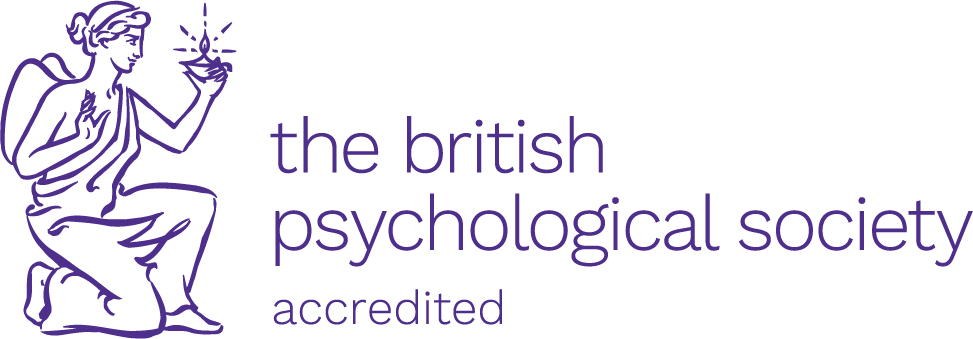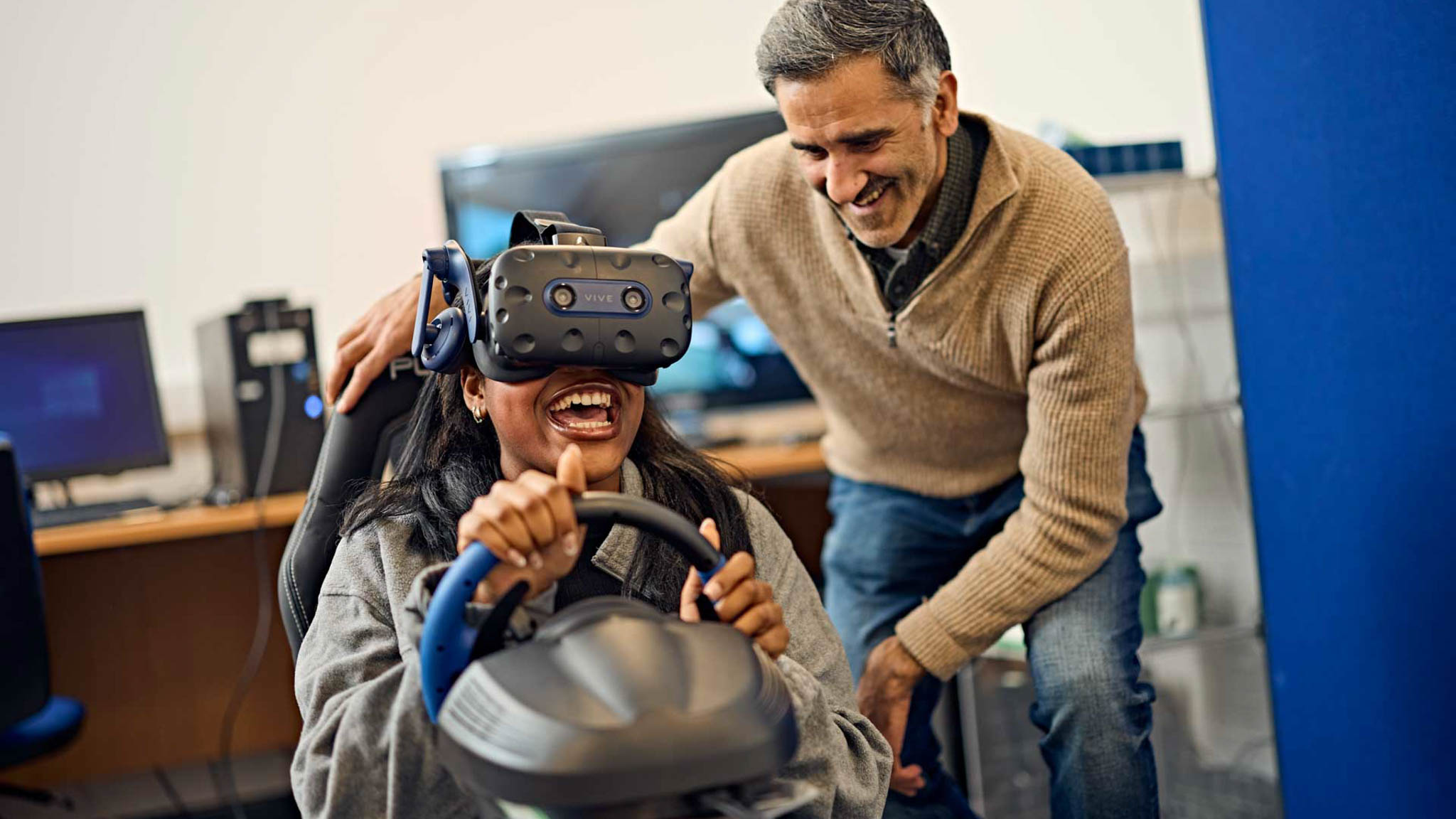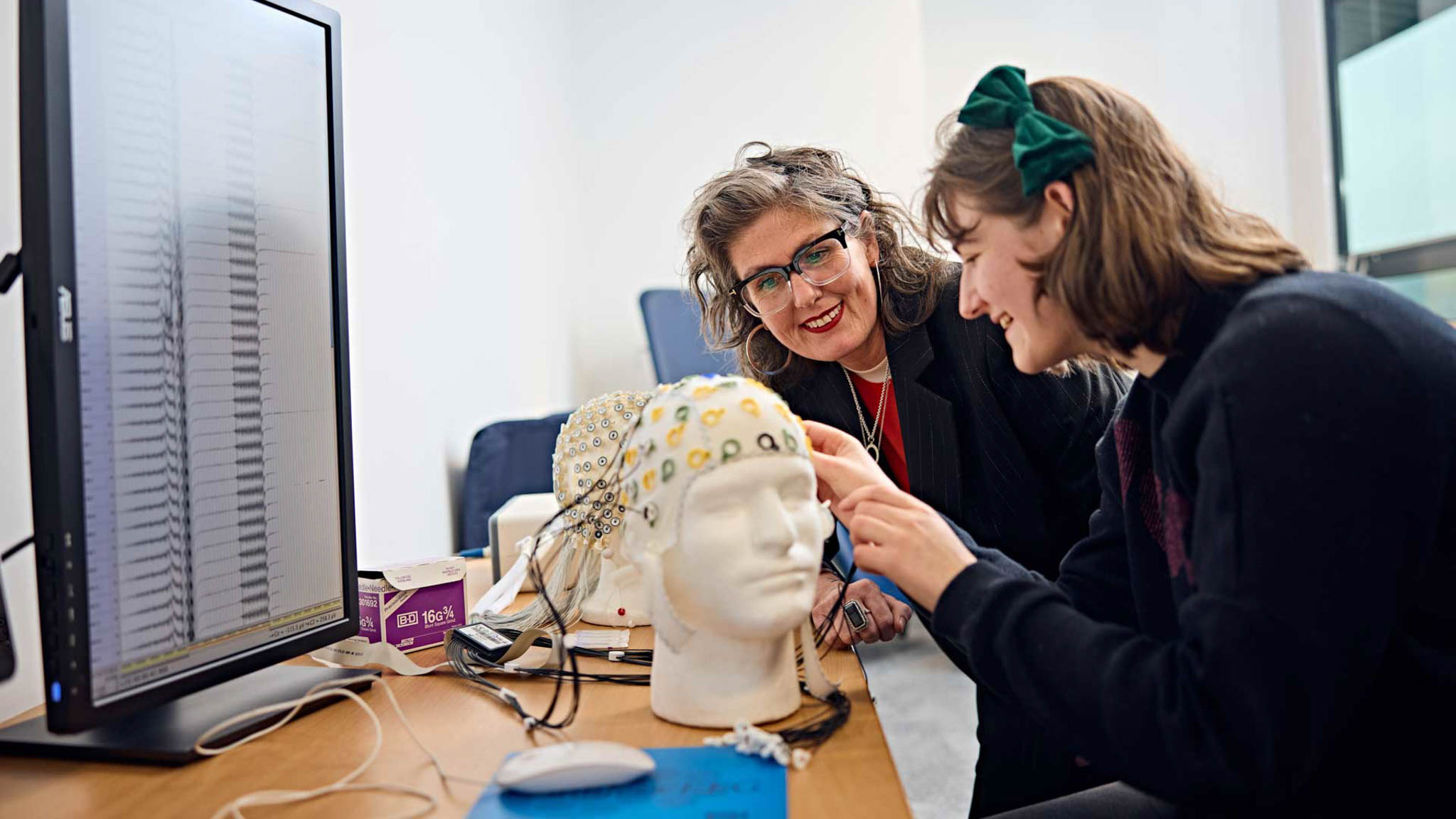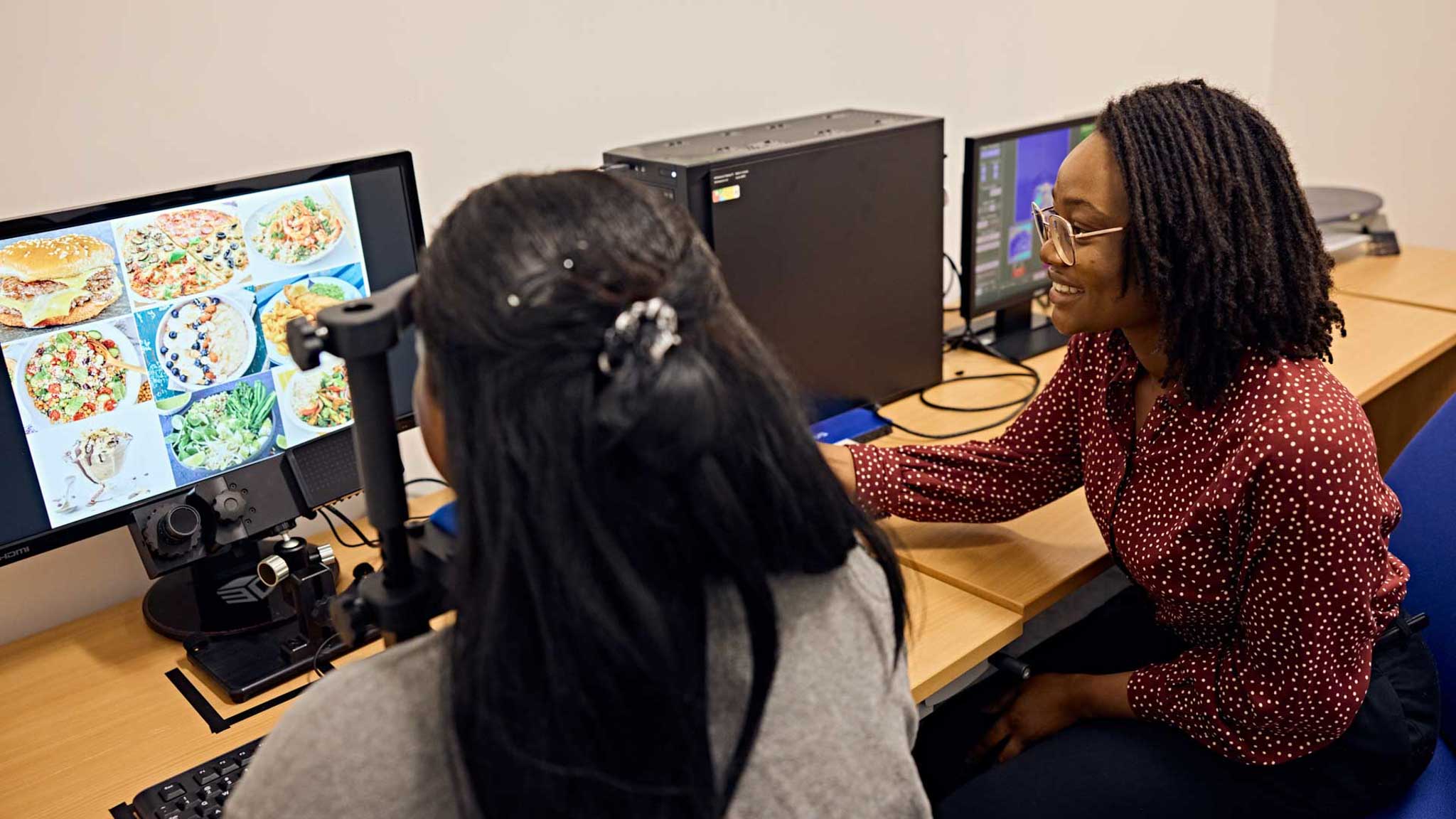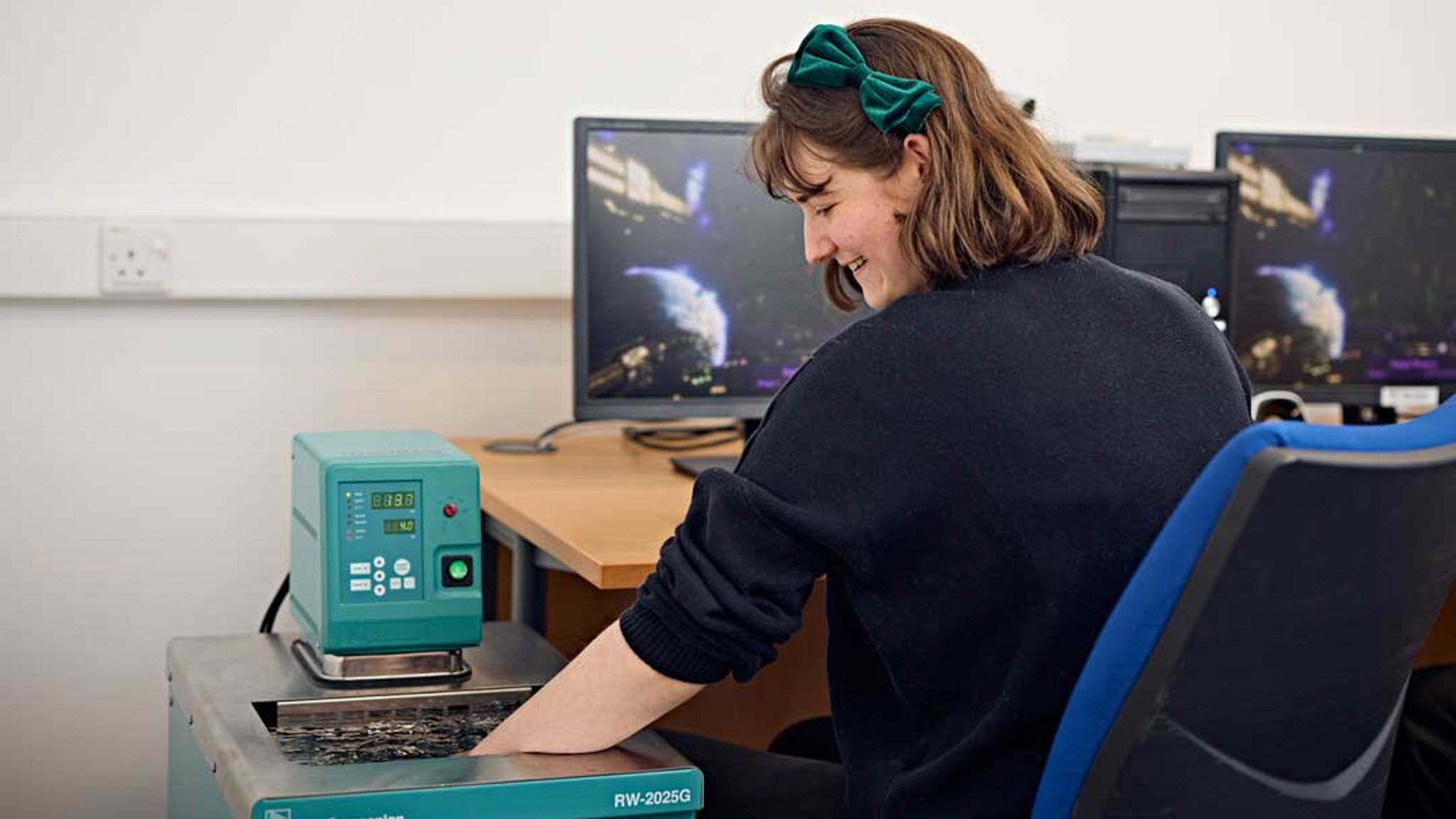
Psychology BSc(Hons)
Start Dates
21 September 2026
Duration
3 years full-time
UCAS Tariff
120-112
Overview
Why choose Huddersfield for this course?
- We’re ranked 4th for Psychology in Yorkshire and the Humber in the Guardian League Tables 2026.
- In the National Student Survey 2025, Psychology is ranked top in Yorkshire for learning resources, assessment and feedback.
- Small class sizes, personal tutors, and wellbeing support ensures you’re well supported and never just a number.
Accreditation and Professional Links
Recognised connections to give you an extra edge when you graduate. Read More
What makes people behave in certain ways? What are the mental and physical processes that underlie our actions? How do we perceive and understand things – and what role does the unconscious mind play in our day-to-day lives?
This undergraduate Psychology BSc(Hons) degree provides valuable insight into the nature of human behaviour, answering all these questions and more. It gives you the opportunity to gain skills that can be applied to many situations, careers, and further study, combined with the flexibility to explore a wide range of topics relating to mental processes and social behaviours. These include perception, cognition, emotions, motivation, personality and interpersonal relationships.
You’ll also look at current and sometimes controversial issues by examining case studies.
Why study Psychology BSc(Hons)
In Yorkshire and the Humber, we’ve ranked 4th for Psychology in the Guardian League Tables 2026. Also, in the National Student Survey 2025, Psychology is ranked top in Yorkshire for learning resources, assessment, and feedback (psychology (non-specific)).
During the course, you’ll be encouraged to think and apply your knowledge, looking at how psychological theories apply in the real-world.
You’ll have the chance to enhance your studies by using specialist equipment in our psychology labs, using electroencephalogram (EEG) machines, biopacs, an eye movement tracker, an Oculus Rift (a virtual reality system), and specialist polygraph (lie detector machine), you’ll gain first-hand experience conducting your own experiments and research.
You’ll be able to apply for Graduate Basis for Chartered Membership of the British Psychological Society, (this course is accredited by the Society), if you graduate with a Lower Second Class Honours or higher and complete the empirical psychology project.
Some of our final-year optional modules are partly taught by professional clinical and forensic psychologists, giving you the opportunity to learn directly from those in professional practice. Many of our lecturers are members of our Centre for Cognition and Neuroscience, too, and produce world-leading research in this field, ensuring you’ll be taught by some people at the cutting-edge of their discipline.
If you’re keen to enrol on a Psychology course, consider broadening your skills on our Psychology BSc(Hons). This course aims to ensure you’re more attractive to employers or will prepare you for further study.
If you do not have the appropriate qualifications for direct entry to this degree you may be able to apply to our Psychology and Crime Foundation Pathway leading to a BSc(Hons) Degree or our Health Foundation Pathway leading to a BSc(Hons) Degree.
Entry Requirements
BBB-BBC at A Level.
DDM-DMM in BTEC Level 3 Extended Diploma.
120-112 UCAS tariff points from a combination of level 3 qualifications.
Any NCFE CACHE Technical Level 3 subject provided it equates to 120 UCAS points.
Access to Higher Education Diploma with 45 Level 3 credits at Merit or above.
Merit at T Level
120-112 UCAS tariff points from International Baccalaureate qualifications including a Higher Level at grade 6 and Maths and English Language GCSE at grade 4 or above or grade C if awarded under previous GCSE grading scheme (can include IELTS for the English GCSE grade 4 equivalency).
In addition you must have Level 2 Maths or Numeracy or GCSE Maths at grade 4 or above, or grade C or above if awarded under the previous GCSE grading scheme.
If you do not have the appropriate qualifications for direct entry to this degree you may be able to apply to our Psychology and Crime Foundation Pathway leading to a BSc(Hons) Degree or our Health Foundation Pathway leading to a BSc(Hons) Degree.
If your first language is not English, you will need to meet the minimum requirements of an English Language qualification. The minimum for IELTS is 6.0 overall with no element lower than 5.5, or equivalent. Read more about the University’s entry requirements for students outside of the UK on our International Entry Requirements page. If you have alternative qualifications or do not meet the IELTS requirement we also offer a range of Pre-Sessional English Programmes.
You may be eligible to gain accreditation for your prior learning towards this course.
If you have alternative qualifications you may wish to contact us for advice before applying.
Other suitable experience or qualifications will be considered. For further information please see the University's minimum entry requirements.
Course Details
Option modules. Choose two from a list which may include:
For more information on when and how we update our modules please see the ‘Legal Information’ section below.
Option modules. Choose four from a list which may include:
For more information on when and how we update our modules please see the ‘Legal Information’ section below.
Teaching and Assessment
Discover what to expect from your tutor contact time, assessment methods, and feedback process.
Global Professional Award
At Huddersfield, you’ll study the award-winning Global Professional Award (GPA) alongside your degree* — so you’re ready for the career you want, whatever subject you choose.
Your Career
Previous Huddersfield Psychology graduates have gone on to work in education, healthcare, research, business and public services in organisations including the NHS, The Kirklees Dementia Hub, UK Home Office, Reed in Partnership, Practice Plus Group, BBT Group Ltd and Holmfirth High School.
90%
Graduates from this course were in work or further study 15 months after graduation.
* HESA Graduate Outcomes 21/22, UK Domiciled
The course enabled me to develop transferable research and social skills, which involved reflecting on sensitive topics alongside Clinical Psychologists. This helped me to develop interpersonal and transferable skills including active listening and communication.
- Aaliyah Siddique
graduated from Psychology BSc(Hons) in 2022, now an Assistant Psychologist in the NHS
Fees and Finance
This information is for Home students applying to study at the University of Huddersfield in the academic year 2026/27.
Please note that tuition fees for subsequent years may rise in line with inflation (RPI-X) and/or Government policy.
From January 2027 the UK government is launching a new student funding system for people starting university education. Read more about the Lifelong Learning Entitlement (LLE).
For detailed information please visit https://www.hud.ac.uk/study/fees/
This information is for international students applying to study at the University of Huddersfield in the academic year 2026/27.
Please note that tuition fees for subsequent years may rise in line with inflation (RPI-X) and/or Government policy.
For detailed information please visit https://www.hud.ac.uk/international/fees-and-funding/
Placement
There may be additional travel costs to attend placement.
Scholarships and Bursaries
Discover what additional help you may be eligible for to support your University studies.
Tuition Fee Loans
Find out more about tuition fee loans available to eligible undergraduate students.
What’s included in your fee?
We want you to understand exactly what your fees will cover and what additional costs you may need to budget for when you decide to become a student with us.
If you have any questions about Fees and Finance, please email the Student Finance Team.
Gallery
Explore More
Why Hud
Explore the unique opportunities and resources that make our institution a top choice for students seeking a well-rounded and future-focused education.
More Info
Careers support
We know you’re coming to university to study on your chosen subject, meet new people and broaden your horizons. However, we also help you to focus on life after you have graduated to ensure that your hard work pays off and you achieve your ambition.
Find out more about careers supportStudent support
At the University of Huddersfield, you’ll find support networks and services to help you get ahead in your studies and social life. Whether you study at undergraduate or postgraduate level, you’ll soon discover that you’re never far away from our dedicated staff and resources to help you to navigate through your personal student journey.
See our support servicesTeaching Excellence
Great teaching is engaging and inspiring — it helps you reach your full potential and prepares you for the future. We don’t just teach well — we excel — and we have the awards and recognition to prove it.
Find out moreInspiring Academics
Our researchers carry out world-leading work that makes a real difference to people’s lives. Staff within the Department of Social and Psychological Sciences may teach you on this course.
Find out more about our staffResearch Excellence
You’ll be taught by staff who want to support your learning and share the latest knowledge and research.
Find out moreAccommodation
Looking for student accommodation? Huddersfield has you covered. HudLets has a variety of accommodation types to choose from, no matter what your preference. HudLets is the University’s approved accommodation service, run by Huddersfield Students’ Union.
Take a look at your optionsFurther Study
If you want to continue your learning beyond your undergraduate degree, there is a range of financial support available for postgraduate study, including discounts for Huddersfield graduates.
Discover postgraduate coursesLegal information
When you enrol as a student of the University, your study and time with us will be governed by our terms and conditions, Handbook of Regulations and associated policies. It is important that you familiarise yourself with these as you will be asked to agree to them when you join us as a student. You will find a guide to the key terms here, along with the Student Protection Plan.
Although we always try and ensure we deliver our courses as described, sometimes we may have to make changes for the following reasons:
Changes to a course you have applied for but are not yet enrolled on
If we propose to make a major change to a course that you are holding an offer for, then we will tell you as soon as possible so that you can decide whether to withdraw your application prior to enrolment. We may occasionally have to withdraw a course you have applied for or combine your programme with another programme if we consider this reasonably necessary to ensure a good student experience, for example if there are not enough applicants. Where this is the case we will notify you as soon as reasonably possible and if you are unhappy with the change we will discuss with you other suitable courses we can transfer your application to. If you do not wish to transfer to another course with us, you may cancel your application and we will refund you any deposits or fees you have paid to us.
Changes to your course after you enrol as a student
Changes to option modules
Where your course allows you to choose modules from a range of options, we will review these each year and change them to reflect the expertise of our staff, current trends in research and as a result of student feedback or demand for certain modules. We will always ensure that you have an equivalent range of options to that advertised for the course. We will let you know in good time the options available for you to choose for the following year.
Major changes
We will only make major changes to non-optional modules on a course if it is necessary for us to do so and provided such changes are reasonable. A major change is a change that substantially changes the outcomes, or a significant part of your course, such as the nature of the award or a substantial change to module content, teaching days (part time provision), type of delivery or assessment of the core curriculum. For example, it may be necessary to make a major change to reflect changes in the law or the requirements of the University’s regulators or a commissioning or accrediting body. We may also make changes to improve the course in response to student, examiners’ or other course evaluators’ feedback or to ensure you are being taught current best practice. Major changes may also be necessary because of circumstances outside our reasonable control, such as a key member of staff being unable to teach due to illness, where they have a particular specialism that can’t be adequately covered by other members of staff; or due to pandemics, other disasters (such as fire, flood or war) or changes made by the government.
Major changes would usually be made with effect from the next academic year, but may happen sooner in an emergency. We will notify you as soon as possible should we need to make a major change and will consult with affected groups of students and any changes would only be made in accordance with our regulations. If you reasonably believe that the proposed change will cause you detriment or hardship we will, if appropriate, work with you to try to reduce the adverse effect on you or find an appropriate solution. Where an appropriate solution cannot be found and you let us know before the change takes effect you can cancel your registration and withdraw from the University without liability to the University for any additional tuition fees. We will provide reasonable support to assist you with transferring to another university if you wish to do so and you may be eligible for an exit award depending on how far through your course you are.
In exceptional circumstances, we may, for reasons outside of our control, be forced to discontinue or suspend your course. Where this is the case, a formal exit strategy will be followed in accordance with the student protection plan.
The Office for Students (OfS) is the principal regulator for the University.

